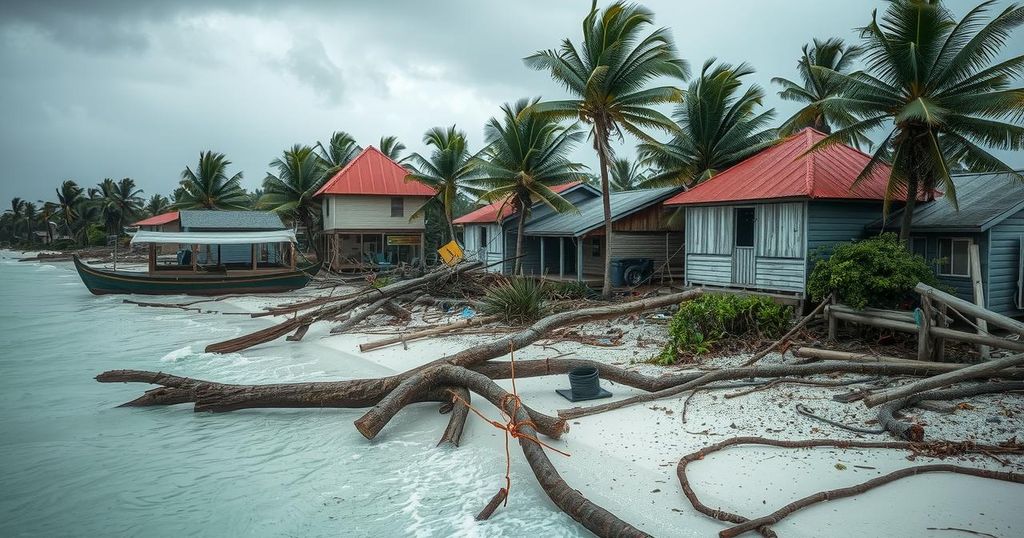World news
AFRICA, BRUNO RETAILLEAU, CAPE TOWN, CHAD YOUYOU, EMERGENCY RESPONSE, EUROPE, EUROPEAN UNION, FRANCE, FRANCOIS BAYROU, FRANÇOIS BAYROU, FRENCH INTERIOR MINISTRY, FRENCH WEATHER SERVICE, INTERIOR MINISTRY, MAYOTTE, NATURAL DISASTER, NATURAL DISASTERS, RESCUE OPERATIONS, SOUTH AFRICA
Fatima Khan
0 Comments
Devastation of Cyclone Chido Leaves 11 Dead in Mayotte and Threatens Mozambique
Cyclone Chido has left at least 11 people dead and caused extensive damage in Mayotte before making landfall in Mozambique. Rescue efforts are underway as authorities prepare for the storm’s impact on 2.5 million people. The cyclone’s devastating winds have led to significant infrastructure damage and heightened concerns of waterborne diseases due to stagnant floodwaters.
Cyclone Chido has caused devastating effects in Mayotte, a French territory in the Indian Ocean, resulting in at least 11 fatalities and significant destruction across the island. The storm, characterized as a category 4 cyclone, unleashed winds exceeding 220 kph (136 mph), severely impacting the vulnerable communities. As Chido moved swiftly toward Mozambique, authorities predicted further devastation as it approached regions housing approximately 2.5 million individuals, prompting aid agencies to express concerns over additional casualties. Rescue operations are underway, with essential supplies being dispatched to restore vital infrastructure, which has been critically damaged, including hospitals and the main airport.
In Mayotte, emergency services are grappling with the aftermath, as reports indicate that hundreds have been injured, with nine individuals remaining in critical condition. Local residents have documented the catastrophic aftermath, revealing extensive damage, including uprooted trees and flattened neighborhoods. Authorities in Comoros are also dealing with repercussions, as 11 fishermen are reported missing. French officials have signaled this cyclone as the most destructive event in the region in nearly a century.
As the situation unfolds in Mozambique, UNICEF highlights significant destruction in Cabo Delgado province, warning that communities may face isolation from essential services for weeks. The cyclone season from December to March poses continuous challenges, with past systems causing severe humanitarian crises in southern Africa. Climate change has been identified as a key factor exacerbating the frequency and intensity of such storms, underscoring the urgent need for support from wealthier nations.
Efforts are being organized to create a reliable air and sea bridge to Mayotte, with additional rescue teams being sent from France and Reunion. French President Emmanuel Macron is actively monitoring developments, affirming the nation’s commitment to providing aid. The dire situation reflects the broader implications of climatic events on socio-economic conditions and the necessity for global cooperation in addressing the resultant humanitarian crises.
Cyclone Chido’s impact on Mayotte and Mozambique highlights the growing severity of extreme weather events within the context of climate change. The territory of Mayotte, characterized by impoverished conditions, is particularly vulnerable to such natural disasters. The cyclone season in the southeastern Indian Ocean typically spans from December to March, exacerbating the destructive potential of storms. Historical events, such as Cyclone Idai in 2019 and Cyclone Freddy in 2022, further illustrate the perilous situation in southern Africa, necessitating urgent humanitarian aid and preparedness measures.
In conclusion, Cyclone Chido represents a significant humanitarian crisis for Mayotte and Mozambique, resulting in loss of life and extensive damages. As authorities work to manage the devastation and provide necessary relief, the looming threats of future storms emphasize the critical intersection of climate change and economic vulnerability in the region. Global assistance and commitment to mitigating the impacts of such climatic events remain paramount for the affected communities.
Original Source: time.com




Post Comment